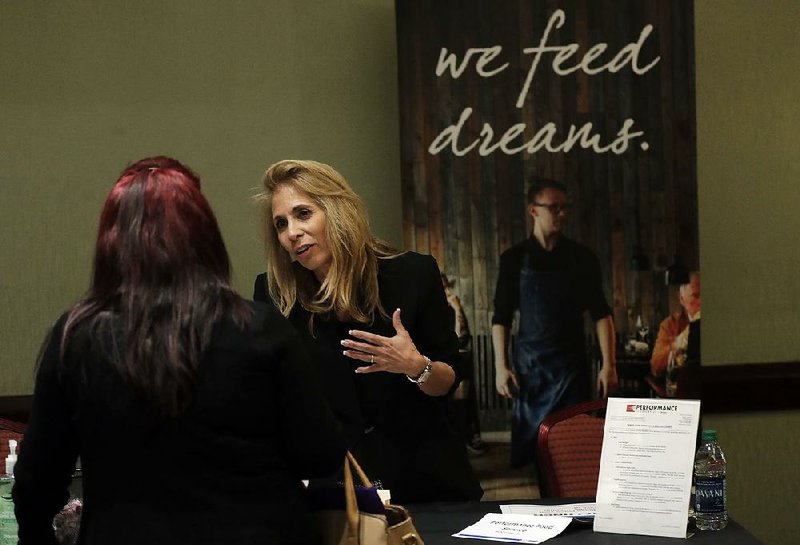As the unemployment rate has fallen in recent months and the economy has roared, one central question has bedeviled the U.S. job market: Where is the wage growth?
New data Friday suggested an answer: It is here, and it is now.
Average hourly earnings jumped 2.9 percent in January from a year earlier, the Labor Department said Friday, the latest sign that the long, slow economic recovery is at last reaching Americans' pocketbooks. Separate data released earlier this week showed that private-sector wages and salaries rose 2.8 percent in the final three months of 2017 compared with a year earlier, the fastest growth since the recession.
In January, average hourly pay rose 9 cents to $26.74 after an even bigger increase in December.
"People have been wondering when the wages are going to start to rise," said Catherine Barrera, chief economist of the online job marketplace ZipRecruiter. "I think that over the first six months of this year, we're really going to start to see the wages rise."
If such predictions are borne out, there could be political ramifications. President Donald Trump hailed his economic record in his State of the Union address Tuesday, and Republicans are counting on the strong economy to help them in the midterm elections in November. Most economists contend Trump deserves relatively little credit for the strong economy, which predates his election and is partly a result of a global rebound outside his control. But voters may not focus on such nuances.
The pickup in wages could make it likelier that the Federal Reserve will raise short-term interest rates more quickly in coming months. In anticipation of inflation pressures and of a possible acceleration of Fed rate hikes, investors sent the yield on the benchmark 10-year Treasury note surging after the jobs report was released. The yield reached 2.84 percent, from 2.79 percent before the jobs report was released.
Stock prices also plunged after the jobs report was issued, partly in response to the prospect of higher rates as well as to poor earnings reports from Google's parent company Alphabet, Exxon Mobil and Chevron.
There were some notes of caution in Friday's report. The total number of hours worked -- a measure that combines the number of jobs and the average hours worked on those jobs -- fell slightly, a sign that demand for labor might not be as strong as the headline job-growth figures suggest. And the unemployment rate for blacks, a figure highlighted by Trump after it fell to its lowest recorded level in December, jumped nearly a full percentage point, to 7.7 percent. The unemployment rate for white Americans fell to 3.5 percent.
Economists cautioned against reading too much into a single month of data, which is preliminary and will be revised at least twice. Several times in recent years, wage growth has appeared to pick up, only to fall back to earth in subsequent months. And other measures of wage growth haven't yet shown the same acceleration.
But there is reason to think that pay gains will prove more durable this time around. Job growth has been steady -- employers added 200,000 jobs in January, modestly more than in December -- and the unemployment rate has fallen to 4.1 percent, a 17-year low. That is forcing companies to compete harder for workers, a recipe for pay increases.
"It's as tough as it's ever been," Michael Mabry, president and chief operating officer of Mooyah Burgers, Fries and Shakes, a 100-restaurant chain based in Texas, said of the current hiring environment.
Mabry said that in some parts of the country, workers would walk off the job knowing that they could find another restaurant hiring down the street. Still, he said, Mooyah can't just raise pay across the board -- the burger industry is "a pennies business," Mabry said, and wage increases quickly eat into profits.
Instead, Mabry said, he is looking for ways to make restaurants more efficient by reducing turnover, improving morale and cross-training workers for various jobs. The goal, he said, is to be able to pay higher wages to fewer workers.
Mooyah is also trying to recruit untapped sources of talent. The company recently started a program to help franchisees expand their marketing efforts by hiring at-home parents and others who had not been in the labor force. The jobs are meant to appeal to people who might not be looking for traditional work: They do not require being at an office every day or having a traditional schedule. Mabry said that kind of flexibility made sense when it was harder than ever to fill full-time slots with experienced workers.
"Why do I have to be pigeonholed into a particular resume or a particular experience?" Mabry said of his recruitment approach. "I'm sure there is someone out there who can bring something different to the team. It's just having an open mind."
More companies are likely to adopt that kind of flexible approach as the labor market tightens. And there are other signs that companies are rethinking their approach to hiring. They are becoming more willing to consider candidates with criminal records, for example, or to waive educational requirements. The car retailer AutoNation said this week that it was no longer refusing to hire workers who tested positive for marijuana use -- a sign of changing legal and societal norms, but also an indication that companies are rethinking hiring practices in a tight labor market.
"People who are marginally employable suddenly become highly employable in a period like this," said Joseph Brusuelas, chief economist of RSM, a financial consulting firm.
Information for this article was contributed by staff memebers of The Associated Press.
Business on 02/03/2018
